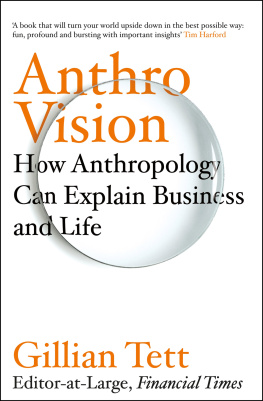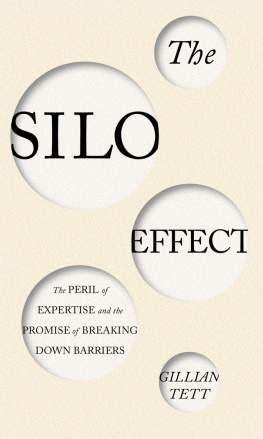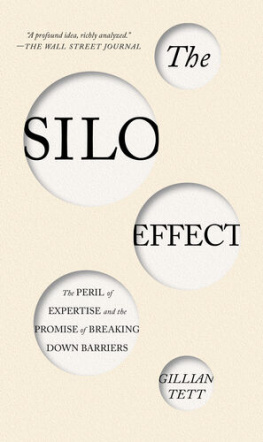Gillian Tett - Anthro-Vision: How Anthropology Can Explain Business and Life
Here you can read online Gillian Tett - Anthro-Vision: How Anthropology Can Explain Business and Life full text of the book (entire story) in english for free. Download pdf and epub, get meaning, cover and reviews about this ebook. year: 2021, publisher: Random House, genre: Politics. Description of the work, (preface) as well as reviews are available. Best literature library LitArk.com created for fans of good reading and offers a wide selection of genres:
Romance novel
Science fiction
Adventure
Detective
Science
History
Home and family
Prose
Art
Politics
Computer
Non-fiction
Religion
Business
Children
Humor
Choose a favorite category and find really read worthwhile books. Enjoy immersion in the world of imagination, feel the emotions of the characters or learn something new for yourself, make an fascinating discovery.
- Book:Anthro-Vision: How Anthropology Can Explain Business and Life
- Author:
- Publisher:Random House
- Genre:
- Year:2021
- Rating:3 / 5
- Favourites:Add to favourites
- Your mark:
- 60
- 1
- 2
- 3
- 4
- 5
Anthro-Vision: How Anthropology Can Explain Business and Life: summary, description and annotation
We offer to read an annotation, description, summary or preface (depends on what the author of the book "Anthro-Vision: How Anthropology Can Explain Business and Life" wrote himself). If you haven't found the necessary information about the book — write in the comments, we will try to find it.
Gillian Tett: author's other books
Who wrote Anthro-Vision: How Anthropology Can Explain Business and Life? Find out the surname, the name of the author of the book and a list of all author's works by series.
Anthro-Vision: How Anthropology Can Explain Business and Life — read online for free the complete book (whole text) full work
Below is the text of the book, divided by pages. System saving the place of the last page read, allows you to conveniently read the book "Anthro-Vision: How Anthropology Can Explain Business and Life" online for free, without having to search again every time where you left off. Put a bookmark, and you can go to the page where you finished reading at any time.
Font size:
Interval:
Bookmark:

PENGUIN BOOKS
UK | USA | Canada | Ireland | Australia
New Zealand | India | South Africa
Penguin Books is part of the Penguin Random House group of companies whose addresses can be found at global.penguinrandomhouse.com.

First published in the United States by Avid Reader Press in 2021
First published in the United Kingdom by Random House Business in 2021
Copyright Gillian Tett 2021
The moral right of the author has been asserted
Jacket photography Getty Images
ISBN: 978-1-473-57822-7
This ebook is copyright material and must not be copied, reproduced, transferred, distributed, leased, licensed or publicly performed or used in any way except as specifically permitted in writing by the publishers, as allowed under the terms and conditions under which it was purchased or as strictly permitted by applicable copyright law. Any unauthorized distribution or use of this text may be a direct infringement of the authors and publishers rights and those responsible may be liable in law accordingly.

Dedicated to the memory of
Ruth Winifred Tett and
Katherine Ruth Gilly (Tett),
who both took joy from the familiar,
but were always curious about strange
The least questioned assumptions are often the most questionable.
PAUL BROCA
Research is formalized curiosity. It is poking and prying with a purpose.
ZORA NEALE HURSTON
The last thing a fish would ever notice would be water.
Ralph Linton
I sat in a drab Soviet hotel room in May 1992. Gunfire rattled the windows. Across the room, on a bed with a nasty brown blanket, sat Marcus Warren, a British journalist. We had been trapped in the hotel for hours, as battles raged on the streets outside in Dushanbe, the capital city of Tajikistan. We had no idea how many had died.
What did you do in Tajikistan before? Marcus asked me, as we nervously listened to the fighting. Until a year earlier this mountainous country, bordering Afghanistan, had seemed a permanent and peaceful part of the Soviet Union. But in August 1991 the Soviet regime had collapsed. That dissolution had propelled the country to independence and sparked a civil war. Marcus and I were there as reporters, respectively for the Daily Telegraph and the Financial Times.
But my background was weird. Before I joined the Financial Times, I had been based in Tajikistan doing research for a PhD in anthropology, that oft ignored (and sometimes derided) branch of the social sciences that studies culture and society. Like generations of earlier anthropologists, I had engaged in fieldwork, which meant immersing myself in a high mountain village a three-hour bus ride from Dushanbe. I lived with a family. The aim was to be an insider-outsider, to observe the Soviet villagers at close quarters and study their culture in the sense of their rituals, values, social patterns, and semiotic codes. I explored questions such as: What did they trust? How did they define a family? What did Islam mean? How did they feel about Communism? What defined economic value? How did they organize their space? In short: What did it mean to be human in Soviet Tajikistan?
So what exactly did you study? Marcus asked.
Marriage rituals, I replied.
Marriage rituals! Marcus exploded, hoarse from exhaustion. What the hell is the point of that? His question masked a bigger one: Why would anyone go to a mountainous country that seemed weird to Westerners and immerse herself in an alien culture to study it? I understood his reaction. As I later admitted in my doctoral thesis: With people dying outside on the streets of Dushanbe, studying marriage rituals did sound exoticif not irrelevant.
This book has a simple aim: to answer Marcuss questionand show that the ideas emanating from a discipline that many people think (wrongly) studies only the exotic are vital for the modern world. The reason is that anthropology is an intellectual framework that enables you to see around corners, spot what is hidden in plain sight, gain empathy for others, and fresh insight on problems. This framework is needed more than ever now as we grapple with climate change, pandemics, racism, social media run amok, artificial intelligence, financial turmoil, and political conflict. I know this from my own career: as this book explains, since I left Tajikistan, I have worked as a journalist and used my anthropology training to foresee and understand the 2008 financial crisis, the rise of Donald Trump, the 2020 pandemic, the surge in sustainable investing, and the digital economy. But this book also explains how anthropology is (and has been) valuable for business executives, investors, policy makers, economists, techies, financiers, doctors, lawyers, and accountants (yes, really). These ideas are as useful in making sense of an Amazon warehouse as in an Amazon jungle.
Why? Many of the tools we have been using to navigate the world are simply not working well. In recent years we have seen economic forecasts misfire, political polls turn out to be wrong, financial models fail, tech innovations turn dangerous, and consumer surveys mislead. These problems have not arisen because those tools are wrong or useless. They are not. The problem is such tools are incomplete; they are used without an awareness of culture and context, created with a sense of tunnel vision, and built assuming that the world can be neatly bounded or captured by a single set of parameters. This might work well when the world is so stable that the past is a good guide to the future. But it does not when we live in a world of flux, or what Western military experts describe as VUCA, short for volatility, uncertainty, complexity, and ambiguity. Nor when we face black swans (to cite Nassim Nicholas Taleb), radical uncertainty (as the economists Mervyn King and John Kay say), and an uncharted future (to quote Margaret Heffernan).
Or to put it another way, trying to navigate the twenty-first-century world only using the tools developed in the twentieth-century, such as rigid economic models, is like walking through a dark wood with a compass at night and only looking down on the dial. Your compass may be technically brilliant and tell you where to aim. But if you only focus on the dial, you may walk into a tree. Tunnel vision is deadly. We need lateral vision. That is what anthropology can impart: anthro-vision.
This book offers extensive ideas about how to gain anthro-vision, using personal and third-party stories that explore questions such as: Why do we need offices? Why do investors misread risks? What matters to modern consumers? What should economists learn from Cambridge Analytica? What is driving green finance? How should governments Build Back Better? How does culture interact with computers? Before plunging into the details, however, there are three core principles of the anthropology mindset that are the most important to grasp, and which shape the structure of this book. The first idea is that in an era of global contagion, we urgently need to cultivate a mindset of empathy for strangers and value diversity. Anthropologists are experts in this since the discipline was founded around the goal of venturing to far-flung places to study seemingly exotic peoples. That creates a whiff of Indiana Jones. But that tag is misleading. explains that if only Western policy makers had bothered to learn some lessons from strange countries in West Africa or Asia, they would never have fallen prey to the COVID-19 pandemic.)
Next pageFont size:
Interval:
Bookmark:
Similar books «Anthro-Vision: How Anthropology Can Explain Business and Life»
Look at similar books to Anthro-Vision: How Anthropology Can Explain Business and Life. We have selected literature similar in name and meaning in the hope of providing readers with more options to find new, interesting, not yet read works.
Discussion, reviews of the book Anthro-Vision: How Anthropology Can Explain Business and Life and just readers' own opinions. Leave your comments, write what you think about the work, its meaning or the main characters. Specify what exactly you liked and what you didn't like, and why you think so.













